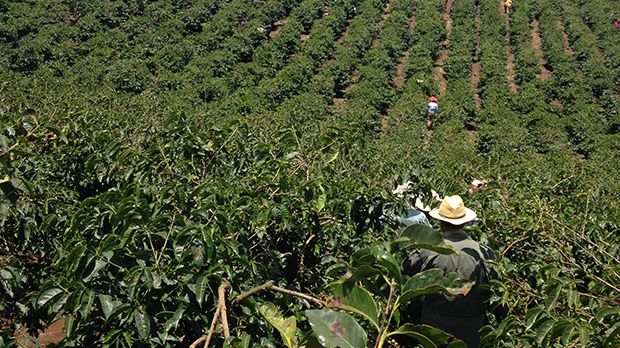
Blog post -
Volcanically good coffee
Seeds have the potential to grow into something big. Some fail, while others, with the right knowledge and driving force, can reach their full potential. The latter applies to a great extent to the interesting coffee plantations in northern Tanzania.
This is my (but not our) first trip to Tanzania. I visit coffee farmers that deliver good tasting speciality coffee of high quality to us, and some that may be able to in the future. During my trip, I live and move about among dormant volcanoes on an altitude higher than 1.500 metres (about 4.900 feet) above sea level. My journey in the breath taking mountains of the northern districts begins in Kilimanjaro. In these districts, the coffee farmers are waiting for the rain that will trigger the flowering. One can tell that the dry period draws to an end, some places are very dry. Up in the mountains, it is relatively cool and the clouds up here wrap the verdant trees with their humidity.
I get an insight into how important the pruning is for productivity. The coffee farmers in one plantation prone the trees on exactly the same height with help from a 2 metres (6 feet) tall pole. They use their secateurs on the tree trunks with skilled hands, and they use two trunks per root that grow by turns to give the tree continuous harvest. It is a method that is used in other places too, for example in Kenya. The coffee farmers I meet tell me that it works very well.
I try beans from different trees and processing methods together with representatives from other coffee companies from all over the world during intense cupping sessions according to the standards of the Speciality Coffee Associations of America. It gives me more insight into how much the cup is affected by fine adjustments to the genuine craft in the production of the beans.
I also visit a farm that has been certified by the Rainforest Alliance for several years. I get to meet chief agronomist Martin, who tells me that it has resulted in a positive development. Among other things, the biodiversity has increased, with more kinds of shade trees, and the already rich bird life has intensified. I can see with my own eyes that a more natural balance gives the power to adopt to possible climate changes in a better way. The certification has also contributed to developing the society in a positive direction. It is exemplified by the success of uniting four local groups and getting them to work and live together on the farm. Besides the good coffee they offer me, I get to see their faces lit up with joy when they show me the local culture in form of the different groups' unique dancing and captivating singing. I get to hear about their thoughts on the fact that if they can unite and become stronger on a farm, it is also possible on a country level.
After my in-depth study of the many and often complex flavours of East African coffees, I make my way home again by the winding mountain roads. I am filled with interesting impressions and ideas as well as admiration for how small seeds can grow into the most beautiful coffee trees if handled in the right way.
// Martin Löfberg

